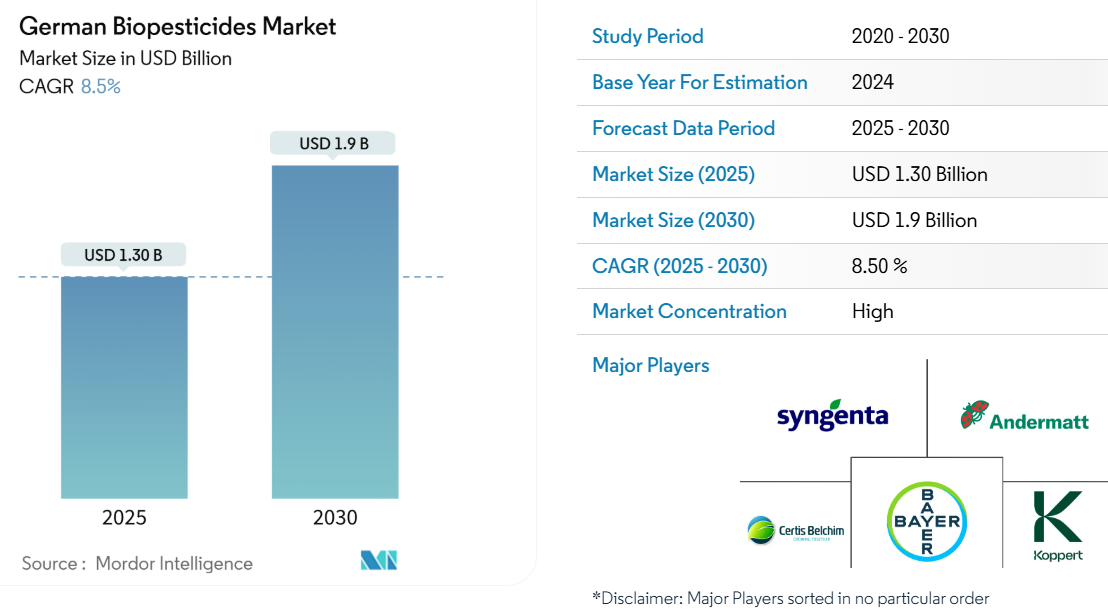Mordor Intelligence has published a new report on the Germany Biopesticides Market, offering a comprehensive analysis of trends, growth drivers, and future projections.
The German biopesticides market is anticipated to grow from USD 1.30 billion in 2025 to USD 1.9 billion by 2030, reflecting a compound annual growth rate (CAGR) of 8.5%. Germany’s agricultural sector is undergoing a significant transformation, with a pronounced shift towards sustainable and environmentally friendly practices. Central to this evolution is the adoption of biopesticides—natural pest control agents derived from organisms such as plants, bacteria, and certain minerals. These products offer effective pest management solutions while minimizing ecological footprints. The increasing consumer demand for organic produce and stringent regulatory frameworks limiting chemical pesticide residues have further propelled the integration of biopesticides into mainstream farming practices.
Key Trends
-
Expansion of Organic Farming
Germany has emerged as a leader in organic agriculture within Europe. According to Eurostat in 2023, organic farming represented 14% of all German agricultural operations, encompassing 36,680 organic farms. The organic agricultural area reached 1.91 million hectares, accounting for 11% of total farmland. This growth underscores the nation’s commitment to sustainable farming practices, subsequently increasing the demand for biopesticides that align with organic farming standards.
-
Stringent Food Safety and Environmental Regulations
Germany enforces strict limits on pesticide residue levels in food products to ensure consumer safety. Biopesticides, characterized by minimal or no toxic residues, often meet these rigorous standards, making them preferable alternatives to synthetic chemicals. This regulatory environment has accelerated the adoption of biopesticides among German farmers seeking compliance and sustainability.
-
Technological Advancements in Biopesticide Development
Continuous research and development efforts have led to the creation of more effective and targeted biopesticide formulations. Innovations in microbial and botanical-based products have enhanced pest-specific targeting, reduced application rates, and improved overall efficacy, making biopesticides more appealing to conventional and organic farmers alike.
Market Segmentation
The German biopesticides market is segmented based on type and application:
-
By Type:
-
Bioherbicides: Natural agents used to control or suppress unwanted plant species (weeds).
-
Bioinsecticides: Biological formulations targeting insect pests, reducing reliance on chemical insecticides.
-
Biofungicides: Products derived from natural organisms to combat fungal pathogens affecting crops.
-
Other Types: Includes bionematicides and other specialized biopesticides addressing specific pest challenges.
-
-
By Application:
-
Grains & Cereals: Biopesticides are utilized to protect staple crops like wheat and barley from pests and diseases.
-
Pulses & Oilseeds: Application in crops such as soybeans and rapeseed to manage pests without compromising oil quality.
-
Fruits & Vegetables: Extensive use in high-value crops to ensure produce meets safety standards and consumer expectations.
-
Other Applications: Encompasses non-food crops and ornamental plants where biopesticides play a role in integrated pest management strategies.
-
Get a Customized Report Tailored to Your Requirements. – https://www.mordorintelligence.com/market-analysis/biopesticides
Key Players
The German biopesticides market features several prominent companies driving innovation and market growth:
-
Syngenta AG: A global leader in agricultural science, offering a diverse portfolio of biopesticide products tailored to various crop needs.
-
Andermatt Group AG: Specializes in biological crop protection solutions, emphasizing sustainable agriculture practices.
-
Certis Belchim B.V: Provides integrated pest management solutions with a strong focus on biological products.
-
Bayer AG: A key player in the agrochemical industry, investing significantly in the development of biopesticides to complement its traditional product lines.
-
Koppert Biological Systems: Renowned for its innovative biological solutions, including biopesticides, enhancing crop health and yield.
Conclusion
The projected growth of the German biopesticides market to USD 1.9 billion by 2030 reflects a broader agricultural paradigm shift towards sustainability and environmental stewardship. Factors such as the expansion of organic farming, stringent regulatory standards, and technological advancements in biopesticide formulations are collectively driving this market’s expansion. As consumer awareness and demand for safe, sustainably produced food continue to rise, biopesticides are poised to become integral components of modern agricultural practices in Germany.
Industry Related Reports

